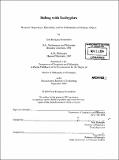Siding with Euthyphro : response-dependence, essentiality, and the individuation of ordinary objects
Author(s)
Sveinsdóttir, Ásta Kristjana
DownloadFull printable version (4.582Mb)
Other Contributors
Massachusetts Institute of Technology. Dept. of Linguistics and Philosophy.
Advisor
Sally Haslanger.
Terms of use
Metadata
Show full item recordAbstract
(cont.) essentiality. I start with our practices of engaging in thought experiments about the essences of things and show how my account vindicates those practices. The motivation for the dissertation is the desire to take a certain Kantian intuition seriously. This is the intuition that aspects of the world may be dependent in some way on, or constructed by, human thought and practices. The aim of the thesis is to offer one clear and coherent articulation of this intuition. What I offer is an account of what makes a property essential to an object that traces the source of that essentiality to our conceptual practices. This is a key component of an anti-realist essentialism. The main claim is that essentiality--the property of being an essential property of an object--is conferred by ideal representatives of us concept users. The idea that a property is conferred is familiar to us from Plato: Does the gods' love confer the property of being pious on the action or do the gods merely detect the property of being pious in the action and their love is simply a reaction to it? How is one to argue that a property is, perhaps despite first appearances, conferred? In the first chapter, I draw on the literature on response-dependence to provide a general strategy for arguing that a property is conferred. In the second chapter, I use that general strategy to argue that essentiality is conferred by ideal representatives of us concept users at the limit of enquiry into what we actual concept users are committed to in our use of concepts. It is the ideal representatives' finding it inconceivable that the object in question not have the property that confers essentiality onto a property of the object. In this way essentiality is shown to have its source in our conceptual practices, and not in a world that is independent of us. The third chapter brings out epistemological virtues of my conferralist account of
Description
Thesis (Ph. D.)--Massachusetts Institute of Technology, Dept. of Linguistics and Philosophy, 2004. Includes bibliographical references (leaves 84-87).
Date issued
2004Department
Massachusetts Institute of Technology. Department of Linguistics and PhilosophyPublisher
Massachusetts Institute of Technology
Keywords
Linguistics and Philosophy.